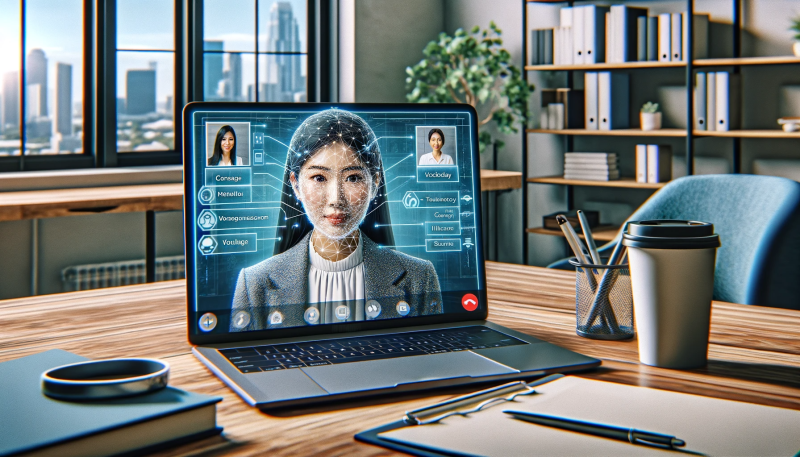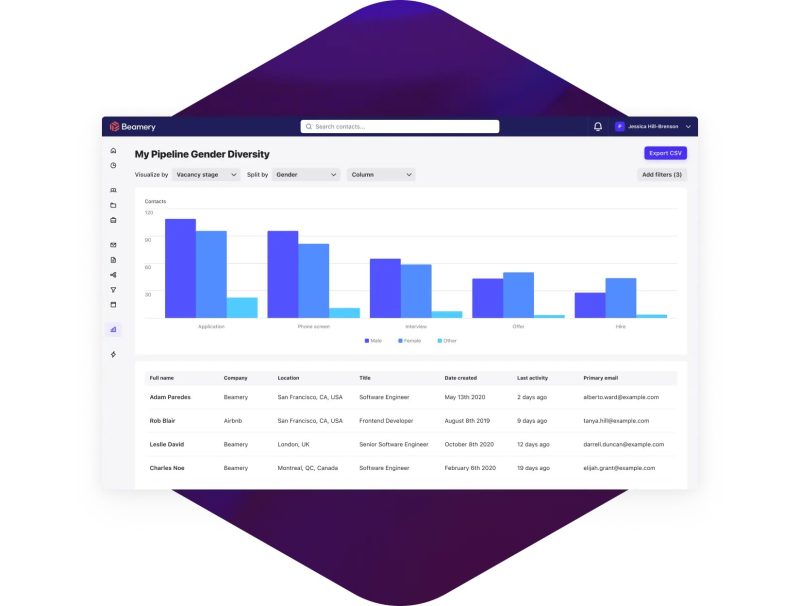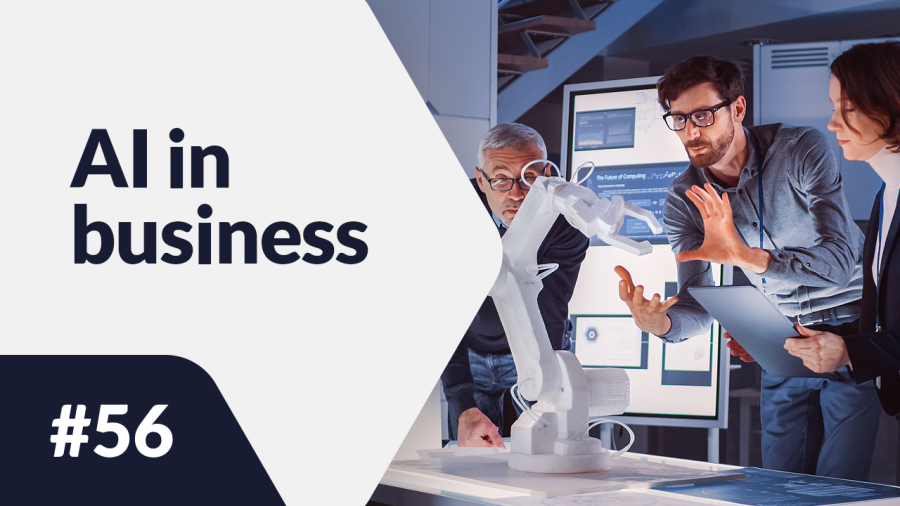The technological revolution is not bypassing HR departments. The cloud, process automation, chatbots and, above all, artificial intelligence (AI) are increasingly boldly entering companies, changing the landscape of recruitment and personnel management. What are the benefits of AI-based automation? What are the challenges facing modern HR?
AI in HR – table of contents:
- The role of AI in HR nowadays
- Key advantages of recruitment automation for small businesses
- Traditional recruitment methods vs. recruitment automation - advantages and disadvantages
- AI in HR in candidate selection - how does it work?
- Impact of automation on team development and engagement
- Skill-based hiring. Is AI the future of HR?
The role of AI in HR nowadays
In the digital age, demand for highly skilled IT professionals continues to grow. Up to 97 million new AI and automation jobs could be created worldwide by 2030, while 75 million positions will be eliminated due to technological advances (World Economic Forum). This presents HR with the challenge of finding people with the right, often unique competencies.
Thanks to the speed of information processing, AI can help weed out the candidates with the best fit for the organization’s needs from a large number of applications. As a result, automating processes can create engaged, aligned teams and increase the efficiency of the HR department.
Key advantages of recruitment automation for small businesses
In small companies, where each employee often performs multiple functions, saving time and resources is extremely valuable. Automating the recruitment process allows you to quickly and efficiently wade through hundreds of resumes, selecting only those that best match the requirements of the position. This allows the HR team to focus on direct contact with selected candidates, which is particularly important in building a positive image of the company as an employer.
Automating recruitment can:
- speed up the recruitment process – algorithms can analyze hundreds of resumes and select the best candidates in seconds,
- save time – AI can carry out the initial selection of applications on its own, which takes this duty off the shoulders of the HR department,
- enhance data and analytics in the selection process – with advanced recruitment management tools, such as Applicant Tracking Systems (ATS), small businesses can manage recruitment processes more efficiently, saving time and increasing the chances of finding the best-fit candidates,
- ensure consistency – the recruitment process is repetitive and unchanging, which provides the company with consistency in its operations.
It is also worth noting the positive impact of automation on the candidate experience. Job seekers appreciate a shorter recruitment process and quick feedback. This is especially important for small businesses, which often compete for talent with larger players in the market. By providing an efficient and friendly recruitment process, small companies can attract quality candidates who are interested in more individual approach and development opportunities that smaller organizations offer.

Source: DALL-E 3, prompt: Marta M. Kania (https://www.linkedin.com/in/martamatyldakania/)
Traditional recruitment methods vs. recruitment automation – advantages and disadvantages
Traditional methods for finding job candidates, such as:
- resume analysis,
- analysis of cover letters,
- recruitment interviews,
- recruitment tasks,
- are time-consuming and prone to human error or bias.
On the other hand, a well-conducted traditional recruitment process gives the candidate valuable feedback and allows him or her to select a person who will fit into the company’s team in many respects.
Undoubtedly, automation of recruitment helps speed it up and solves the problem of personal biases, but the pros and cons calculus does not give a clear result. In place of the problems associated with traditional recruitment, other problems arise:
| Speed | Risk of excluding valuable candidates |
| Wide range | Unclear evaluation criteria included in algorithms |
| Consistency | Difficulty in assessing soft skills |
| Lower costs | Distrust of candidates |
For example, the system may reject a good candidate simply because his or her resume does not contain certain keywords. For this reason, a combination of automation and human evaluation works best.
AI in HR in candidate selection – how does it work?
Artificial intelligence can analyze hundreds of applications in seconds and select the resume that best matches the requirements. How is this possible?
The key is machine learning. Algorithms analyze examples of successful recruitments and learn to recognize patterns that indicate a good candidate fit. Based on this, they can predict the degree of fit between new applications and company requirements and suggest the most promising ones.
Another technique is the creation of so-called “digital twins” of employees, i.e. detailed profiles of ideal candidates created by algorithms based on data analysis. New applications are compared with such a model.
AI-based recruitment automation tools – such as:
- HireVue, – exploits artificial intelligence to assess the potential of job candidates. It operates by the name Human Potential Intelligence and evaluates candidates’ choice of words, tone of voice and facial expressions,
- Beamery – applies AI to manage candidate relationships and recruitment itself, offers features such as automatic screening of candidates, analysis of their data, personalized recruitment campaigns; this tool features in many large companies such as Facebook and Dropbox.

Source: Beamery (https://beamery.com/talent-acquisition/)
They successfully identify qualities such as creativity, ability to cooperate, or initiative. They also make it possible to analyze the commitment and satisfaction of current employees.
Impact of automation on team development and engagement
How does recruitment automation translate into team development and engagement?
First, it helps build a team with a high match of competencies to the company’s needs. Second, it saves the HR department time, which can be spent on skills development and team integration. Third, algorithms can assess the aptitude and motivation of candidates, which is conducive to building an engaged team.
Equally important, the use of AI tools does not end with recruitment. It can play a significant role in developing employees’ skills. For example:
– AI systems identify competency gaps in the team and suggest appropriate training,Skill-based hiring. Is AI the future of HR?
The modern trend in HR called skill-based hiring is ideally combined with AI capabilities. In this approach, what matters are the specific skills and aptitudes of candidates, not just experience or diplomas.
At the same time, the development of AI in HR is opening up new opportunities for personalizing the recruitment and development of employees. AI can help identify skill gaps and suggest individual development paths, which is key to keeping employees engaged and satisfied.

In conclusion, although AI is not yet widely common in the recruitment processes, its potential in this area is enormous. In the future, we can expect AI to play an increasingly important role in identifying and developing talent, making it an extremely promising tool for the future of HR. However, we need to ensure the transparency of the assessment algorithms and the good quality of the data on which the models are taught, so that they do not contain biases.
If you like our content, join our busy bees community on Facebook, Twitter, LinkedIn, Instagram, YouTube, Pinterest, TikTok.
Author: Robert Whitney
JavaScript expert and instructor who coaches IT departments. His main goal is to up-level team productivity by teaching others how to effectively cooperate while coding.
AI in business:
- Threats and opportunities of AI in business (part 1)
- Threats and opportunities of AI in business (part 2)
- AI applications in business - overview
- AI-assisted text chatbots
- Business NLP today and tomorrow
- The role of AI in business decision-making
- Scheduling social media posts. How can AI help?
- Automated social media posts
- New services and products operating with AI
- What are the weaknesses of my business idea? A brainstorming session with ChatGPT
- Using ChatGPT in business
- Synthetic actors. Top 3 AI video generators
- 3 useful AI graphic design tools. Generative AI in business
- 3 awesome AI writers you must try out today
- Exploring the power of AI in music creation
- Navigating new business opportunities with ChatGPT-4
- AI tools for the manager
- 6 awesome ChatGTP plugins that will make your life easier
- 3 grafików AI. Generatywna sztuczna inteligencja dla biznesu
- What is the future of AI according to McKinsey Global Institute?
- Artificial intelligence in business - Introduction
- What is NLP, or natural language processing in business
- Automatic document processing
- Google Translate vs DeepL. 5 applications of machine translation for business
- The operation and business applications of voicebots
- Virtual assistant technology, or how to talk to AI?
- What is Business Intelligence?
- Will artificial intelligence replace business analysts?
- How can artificial intelligence help with BPM?
- AI and social media – what do they say about us?
- Artificial intelligence in content management
- Creative AI of today and tomorrow
- Multimodal AI and its applications in business
- New interactions. How is AI changing the way we operate devices?
- RPA and APIs in a digital company
- The future job market and upcoming professions
- AI in EdTech. 3 examples of companies that used the potential of artificial intelligence
- Artificial intelligence and the environment. 3 AI solutions to help you build a sustainable business
- AI content detectors. Are they worth it?
- ChatGPT vs Bard vs Bing. Which AI chatbot is leading the race?
- Is chatbot AI a competitor to Google search?
- Effective ChatGPT Prompts for HR and Recruitment
- Prompt engineering. What does a prompt engineer do?
- AI Mockup generator. Top 4 tools
- AI and what else? Top technology trends for business in 2024
- AI and business ethics. Why you should invest in ethical solutions
- Meta AI. What should you know about Facebook and Instagram's AI-supported features?
- AI regulation. What do you need to know as an entrepreneur?
- 5 new uses of AI in business
- AI products and projects - how are they different from others?
- AI-assisted process automation. Where to start?
- How do you match an AI solution to a business problem?
- AI as an expert on your team
- AI team vs. division of roles
- How to choose a career field in AI?
- Is it always worth it to add artificial intelligence to the product development process?
- AI in HR: How recruitment automation affects HR and team development
- 6 most interesting AI tools in 2023
- 6 biggest business mishaps caused by AI
- What is the company's AI maturity analysis?
- AI for B2B personalization
- ChatGPT use cases. 18 examples of how to improve your business with ChatGPT in 2024
- Microlearning. A quick way to get new skills
- The most interesting AI implementations in companies in 2024
- What do artificial intelligence specialists do?
- What challenges does the AI project bring?
- Top 8 AI tools for business in 2024
- AI in CRM. What does AI change in CRM tools?
- The UE AI Act. How does Europe regulate the use of artificial intelligence
- Sora. How will realistic videos from OpenAI change business?
- Top 7 AI website builders
- No-code tools and AI innovations
- How much does using AI increase the productivity of your team?
- How to use ChatGTP for market research?
- How to broaden the reach of your AI marketing campaign?
- "We are all developers". How can citizen developers help your company?
- AI in transportation and logistics
- What business pain points can AI fix?
- Artificial intelligence in the media
- AI in banking and finance. Stripe, Monzo, and Grab
- AI in the travel industry
- How AI is fostering the birth of new technologies
- The revolution of AI in social media
- AI in e-commerce. Overview of global leaders
- Top 4 AI image creation tools
- Top 5 AI tools for data analysis
- AI strategy in your company - how to build it?
- Best AI courses – 6 awesome recommendations
- Optimizing social media listening with AI tools
- IoT + AI, or how to reduce energy costs in a company
- AI in logistics. 5 best tools
- GPT Store – an overview of the most interesting GPTs for business
- LLM, GPT, RAG... What do AI acronyms mean?
- AI robots – the future or present of business?
- What is the cost of implementing AI in a company?
- How can AI help in a freelancer’s career?
- Automating work and increasing productivity. A guide to AI for freelancers
- AI for startups – best tools
- Building a website with AI
- OpenAI, Midjourney, Anthropic, Hugging Face. Who is who in the world of AI?
- Eleven Labs and what else? The most promising AI startups
- Synthetic data and its importance for the development of your business
- Top AI search engines. Where to look for AI tools?
- Video AI. The latest AI video generators
- AI for managers. How AI can make your job easier
- What’s new in Google Gemini? Everything you need to know
- AI in Poland. Companies, meetings, and conferences
- AI calendar. How to optimize your time in a company?
- AI and the future of work. How to prepare your business for change?
- AI voice cloning for business. How to create personalized voice messages with AI?
- Fact-checking and AI hallucinations
- AI in recruitment – developing recruitment materials step-by-step
- Midjourney v6. Innovations in AI image generation
- AI in SMEs. How can SMEs compete with giants using AI?
- How is AI changing influencer marketing?
- Is AI really a threat to developers? Devin and Microsoft AutoDev
- AI chatbots for e-commerce. Case studies
- Best AI chatbots for ecommerce. Platforms
- How to stay on top of what's going on in the AI world?
- Taming AI. How to take the first steps to apply AI in your business?
- Perplexity, Bing Copilot, or You.com? Comparing AI search engines
- ReALM. A groundbreaking language model from Apple?
- AI experts in Poland
- Google Genie — a generative AI model that creates fully interactive worlds from images
- Automation or augmentation? Two approaches to AI in a company
- LLMOps, or how to effectively manage language models in an organization
- AI video generation. New horizons in video content production for businesses
- Best AI transcription tools. How to transform long recordings into concise summaries?
- Sentiment analysis with AI. How does it help drive change in business?
- The role of AI in content moderation


















